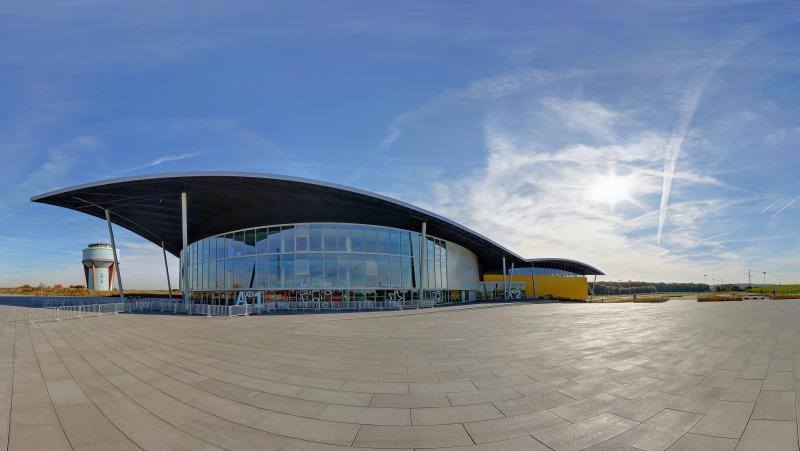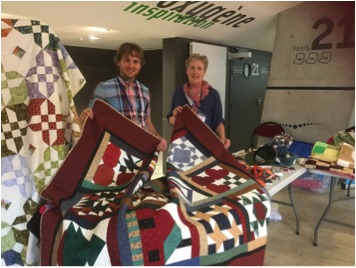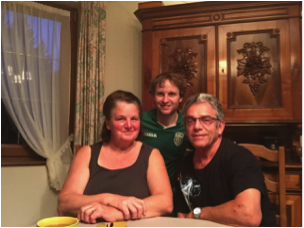Authentic community: Reflecting on the European Mennonite Regional Conference
Between May 10 and 13, thousands of Mennonites from across Europe gathered in the French town of Montbéliard for the 10th European Mennonite Regional Conference. This conference takes place every six years and offers an opportunity for Mennonites to meet and share experiences and stories.
I was struck by the quality and authenticity of the fellowship among the wider European Mennonite family. I cannot remember attending a theological conference that was pervaded by such a deep and meaningful sense of community.

At the conference I gained a new insight into the enormous difference that dedicated and compassionate Mennonites are making to regions throughout Europe. I learned about Mennonite ministries to disabled people in France. I met several inspirational young people, who had chosen to devote their lives to the gospel of peace by serving in Mennonite organisations such as Church and Peace and the German Mennonite Peace Committee.
A whole section in the conference building was occupied by Mennonite workers who had sewn quilts with beautiful tapestries to be sent to Syrian refugees seeking asylum in Turkey and Lebanon.
The plenary conference events were stimulating and creative. On the first evening, a video was played which narrated the unique history of the Mennonite movement. It was significant that the history began not in the 16th century with Huldrych Zwingli or Menno Simons, as I had expected, but in the 1st century with Jesus preaching his Sermon on the Mount. This seemed very appropriate, as I recalled the central place that the sermon in Matthew 5–7 occupies in the history, faith and practice of the global Mennonite movement. Every few minutes the video was paused and a group of actors would enact scenes that gave a creative insight into some of the key moments, themes and issues that have arisen in the tragic history of the Mennonites in Europe.

The smaller workshop sessions on Friday and Saturday afternoon were insightful. I attended a seminar on the Mennonite World Conference (MWC), where I learned from César García, general secretary, and Henk Stenvers, president-elect, about the organisational structures that unite the global Mennonite community. It was inspirational to hear about vibrant Mennonite communities in sub-Saharan Africa, such as Congo and Malawi, and to hear César's and Henk's stories from their visits to these countries.
Apart from the main scheduled events, the most rewarding experiences from the Conference were the serendipity moments and chance encounters with friends old and new. I was delighted to make the acquaintance of Elias Moyo, who is the founder of the Brethren in Christ Church (BICC) United Kingdom, which is an Anabaptist-inspired church with several churches in the UK. Elias, originally from Zimbabwe, has a remarkable testimony. After 23 difficult years in which we was able to plant only one church, his ministry began to flourish. The church now has eight thriving congregations throughout the UK and there are plans to plant even more churches.
Given my links to Ukraine through my work with Dnipro Hope Mission, it was a blessing to meet the group from Zaporizhe Mennonite Church in Eastern Ukraine. The Ukrainians had a stall where they presented their work among the homeless, refugees, drug addicts and other marginalised groups in one of the poorest regions in Europe. There were about 15 young people who had come to the conference with a couple of the leaders of the church. They had all travelled together in an old minibus virtually non-stop for 3,000 miles from Ukraine.

I decided early on that I didn't want to stay in a hotel. Instead, I opted for accommodation with a host family. I stayed with Andre and Danielle, an elderly Mennonite couple who live in a modest little house in a village about five miles from the conference venue. Staying with this wonderful couple gave me a new insight into the transformative power of generous hospitality.
When I told them that I was training for a marathon, they took me out in their car each evening to the Swiss border, from where I could run to and from Switzerland and be back home in time for dinner.
One evening while Andre was driving me back from the conference centre, he noticed a car with Dutch number plates, driven by an elderly couple. They looked lost. Andre indicated the car to stop and we managed to work out that the Dutch couple were trying to find a campsite. Directing the car to follow him, he drove through miles of winding country lanes until eventually we arrived at the campsite. The Dutch couple were overwhelmed with gratitude. They would never have found the campsite without Andre's help. On our way back home from the campsite, I said to Andre in my faltering schoolboy French that he had done a very kind thing for the Dutch couple. He responded simply, 'I had to help them. They were lost. It's what Jesus would have done.'

Also staying in the house of Danielle and Andre was a Ukrainian couple, Aleksei and Oksana. On the final day of the conference, Aleksei asked if there was a petrol station. Danielle said that there was one on the way to the conference centre from their house. When we arrived at the petrol station, Aleksei filled the minibus with diesel. It came well to over €100. Before Aleksei even had a chance to get out his wallet, Danielle stopped him with a firm 'Non! Je vais payer!' and indicated with her own wallet that she wanted to pay. She went to the cashier and paid in full.
I was amazed. For the Ukrainian couple the price of the full tank of fuel would have been roughly equivalent to what they would both earn in a month. When we got back into the car and Aleksei explained to Oksana what had happened, she was overcome with emotion. It was an amazing moment and an example of Christlike generosity, which remains one of my most abiding memories from the whole conference.
In summary, these experiences, as well as the conference itself, have given me a new insight into the global Mennonite family and a fresh inspiration to explore the riches of this remarkable movement.
Dr Joshua Searle is tutor in Theology and Public Thought at Spurgeon's College. He is the author of 'Theology After Christendom: Forming Prophets for a Post-Christian World'.











